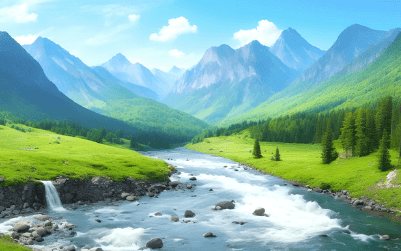Mountain:Xp6pxnmj3zc= Landscapes

Mountain landscapes present a complex interplay of geological, ecological, and cultural elements that merit thorough examination. Their unique features not only shape the physical environment but also foster diverse ecosystems critical to global biodiversity. As recreational activities proliferate in these areas, the balance between preservation and enjoyment becomes increasingly crucial. Furthermore, the cultural narratives associated with these majestic formations often reflect deeper societal values. What remains to be explored is the intricate relationship between human activity and the sustainability of these awe-inspiring regions.
Unique Features of Mountain Landscapes
Rising majestically against the horizon, mountain landscapes evoke a profound sense of awe and wonder.
Characterized by dramatic geological formations, these towering giants reveal their age-old history through rugged peaks and deep valleys. Climatic variations sculpt their surfaces, fostering unique ecosystems and breathtaking vistas.
Each range tells a story of resilience, inviting exploration and igniting the spirit of freedom in those who venture forth.
See also: Modern:-K_Nqjrkq50= House
Ecological Importance of Mountains
Mountains are not only spectacular in their grandeur but also serve as vital ecological pillars within our planet’s environmental framework.
They act as biodiversity hotspots, nurturing a myriad of flora and fauna, while their towering heights play a crucial role in climate regulation.
The majestic peaks, cloaked in diverse ecosystems, inspire a profound connection to nature and evoke a deep sense of freedom in the human spirit.
Recreational Activities in Mountain Regions
A myriad of recreational activities beckon adventurers to the majestic embrace of mountain regions, where the air is crisp and the vistas stretch endlessly.
Hiking trails weave through lush landscapes, while rock climbing challenges the daring. Mountain biking thrills the spirit, and wildlife watching captivates the heart.
From snow sports to scenic photography, these camping spots ignite the passion for adventure tourism in every soul.
Cultural Impact of Mountain Scenery
The breathtaking panorama of mountain scenery has long inspired creativity and shaped cultural identities across the globe.
Rooted in mountain mythology, these majestic heights evoke profound artistic inspiration and spiritual significance. They serve as sacred spaces, fostering emotional connections with nature.
Furthermore, tourism development thrives as individuals seek solace and freedom among these peaks, forging a collective appreciation for the beauty and power of mountainous landscapes.
Conclusion
Mountain landscapes, with their towering peaks and serene valleys, evoke a sense of wonder that transcends time. These natural monuments not only cradle diverse ecosystems but also invite individuals to explore their rugged beauty and rich cultural heritage. As one stands amidst these giants, an undeniable connection to the earth is forged, reminding all of the delicate balance between nature and humanity. In the embrace of mountains, the spirit finds solace, and the heart awakens to the sublime.




